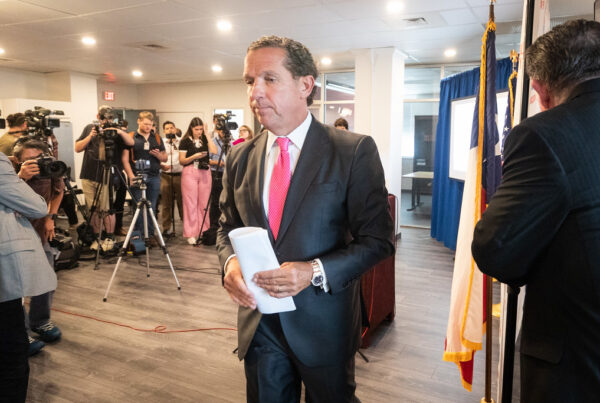From Houston Public Media:
At the sprawling NRG Center in Southwest Houston, about 11,000 Houston ISD teachers attended training sessions last week.
It got off to a rough start. The fire marshal stopped by because several rooms were over capacity. And halfway through the week, Superintendent Mike Miles starred in a musical.
He was appointed to lead Houston’s public school system by the Texas Education Agency in June. In the musical, Miles played the owner of a diner in a town. The local school system faces reforms from a new superintendent … named Mr. Miles.
One scene portrayed reporters asking bad-faith questions about playgrounds.
“So why do you hate children?” asked one reporter, played by a student who later criticized the musical as a “propaganda play.”
“It was pretty disturbing,” said high school teacher Sarah Rivlin.
Rivlin was also bothered by the disorganization, which she felt was “a foreshadowing of what we’re going to expect when the kids show up.”
For his part, Miles says the event was great.
“Look, it was a great convocation,” he asserted. “And anybody who says different, you know, that’s an anecdote. That’s an outlier.”
This type of response is familiar. Miles has repeatedly defended various controversial aspects of his reform agenda, and he’s said that naysayers are not representative of the bulk of Houston ISD’s 11,000 teachers.
“We have about 6,000 members,” said Jackie Anderson, with the Houston Federation of Teachers. The union is critical of the entire reform plan. “So I wouldn’t say it’s just a few naysayers. I would say it’s over half of your teachers.”
The reforms target 85 schools this year. Those campuses will have longer instructional days, strict evaluations for educators, and premade lesson plans. The lessons are tightly scripted, and teachers are expected to use a stopwatch.
“There’s no point of being a teacher if you’re reading a script,” Rivlin said.
Rivlin doesn’t have to adhere to those scripted lessons this year, but she expects her school to be swept up as the New Education System expands to 150 campuses over the next few years.
“Yeah, that’s not the career that I signed up for,” she said. “So I’m going somewhere else.”
Even outside the 150 schools, teachers will see changes. In two years, all Houston ISD educators will have a new compensation system. It’s a “pay-for-performance” model, with salaries tied to test scores and “instructional quality,” instead of experience.
Miles presented the model to teachers last week at NRG Center. Houston Public Media obtained audio of a session for middle and high school teachers. There were some interruptions.
“So, seriously, disruptive people, I will be removing you, and we will find out who you are,” Miles said towards the beginning of one session. “That’s not a threat.”
Eventually, he got to some of the more controversial components of his plan.
“Should elementary school teachers get paid less than middle school teachers, who get paid less than high school teachers?”
Across the room, middle and high school teachers shouted, “No!”
“Should a proficient elective teacher — don’t yell out yet — be paid as much as a proficient (English Language Arts) teacher?”
Teachers yelled out, “Yes!”
Melissa Yarborough was in the crowd. She teaches sixth grade English Language Arts (ELA) at Navarro Middle School. Even though her role is the most valued under Miles’s plan, she’s not a fan.
“I hate it,” she said. “I don’t think … that I’m more valuable than an ELA teacher in the second grade. Or than a social studies teacher or than a music, band teacher.”
During the session, Miles made the case for the ELA teacher to make more money.
“I get so much scrutiny,” he said. “People look at my curriculum. They look at my lesson plans. Why? Because they want to pass the STAAR exam or (other standardized tests).”
Then, Miles allowed a volunteer to present the case for equal compensation. Loreta Kovacic, from Burbank Middle School, took the microphone.
As she introduced herself as a dual-certified theater and choir teacher, the audience cheered.
“I think there was a lot of passion, and some negativity in the audience happening, because people were really kind of defensive about this whole new system,” Kovacic told Houston Public Media. “New this, new that — everything new is always scary.”
On stage with Miles, she told the story of a former student who credited the theater club at Burbank Middle School with developing his teamwork, self-confidence and discipline.
She got a half-minute standing ovation.
“Good case,” Miles said.
Kovacic said she truly appreciated Miles for letting her speak. She felt heard by him, even though she disagreed with the different value assessment for tested subjects versus electives. The salary difference runs up to $15,000 in some schools.
Yes, she said, kids need to know how to do math and read.
“We also have to learn how to speak in front of others, how to express ourselves, how to speak about our emotions,” she said. “So many things that we learned in the fine art subjects. And that includes all of the fine art subjects — and then also all the electives — gym, computers … Everything is being taught in our classes. So we’re kind of the integrators of education.”
Kovacic said she’s keeping an open mind about the changes.
So is social studies teacher Donnie Walker. He works at Wheatley High School — the campus that triggered the TEA takeover by failing to meet state standards for several years — and he had to reapply for his job this summer.
Walker’s been at the school for seven years, and he’s worked through several reform efforts.
“We’ve always faced those challenges,” Walker said. “It’s not a problem to me.”
He wants other teachers to give Miles a chance.
“Why would we want to be in a position to watch something fail so we could point the finger?” he said. “No, let’s just support it.”
But he thinks that same grace should be extended to teachers in the evaluation system. Miles’ plan calls for a forced distribution, where two out of every five teachers will be rated as “less than proficient” every year, and three percent of teachers will be deemed “unsatisfactory” and fired.
“You tell an administrator, ‘Hey, you got to have so many teachers that’s failing,’ — How could you say that?” he said. “How could you say teachers are failing when they’re not?”
Many teachers are increasingly worried about repercussions for speaking to reporters and posting to social media. Educators have been told to not “communicate false or misleading information about the school or District, particularly if designed to damage the school or district’s reputation, or undermines (sic) the school’s or District’s high-performance culture.”
The directive drew criticism from local, state and national leadership of the American Federation of Teachers, with union president Randi Weingarten arguing Miles is “simply promoting a political agenda that more and more has no resonance with the community.”
“It feels like we’re being gaslit,” Yarborough said. “It’s our community that’s being disrupted, and the people in charge don’t seem to care.”
“I thank the media for expressing our opinions on this,” she continued. “Because one, we’re not being heard by the people in charge, and two, we’re being told not to do this. Teachers are scared to talk to media.”













